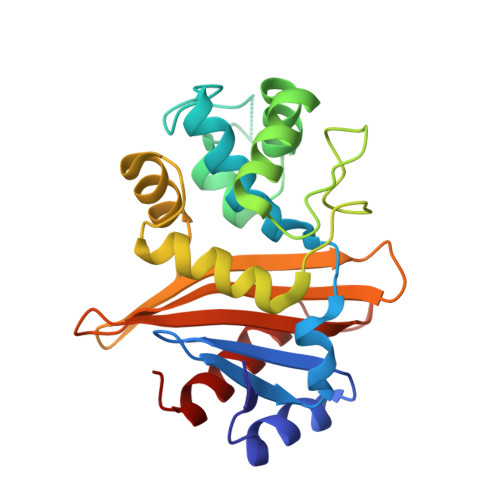Role of the Hydrophobic Bridge in the Carbapenemase Activity of Class D beta-Lactamases.
Stewart, N.K., Smith, C.A., Antunes, N.T., Toth, M., Vakulenko, S.B.(2019) Antimicrob Agents Chemother 63
- PubMed: 30530607
- DOI: https://doi.org/10.1128/AAC.02191-18
- Primary Citation of Related Structures:
6N6T, 6N6U, 6N6V, 6N6W, 6N6X, 6N6Y - PubMed Abstract:
Class D carbapenemases are enzymes of the utmost clinical importance due to their ability to confer resistance to the last-resort carbapenem antibiotics. We investigated the role of the conserved hydrophobic bridge in the carbapenemase activity of OXA-23, the major carbapenemase of the important pathogen Acinetobacter baumannii We show that substitution of the bridge residue Phe110 affects resistance to meropenem and doripenem and has little effect on MICs of imipenem. The opposite effect was observed upon substitution of the other bridge residue Met221. Complete disruption of the bridge by the F110A/M221A substitution resulted in a significant loss of affinity for doripenem and meropenem and to a lesser extent for imipenem, which is reflected in the reduced MICs of these antibiotics. In the wild-type OXA-23, the pyrrolidine ring of the meropenem tail forms a hydrophobic interaction with Phe110 of the bridge. Similar interactions would ensue with ring-containing doripenem but not with imipenem, which lacks this ring. Our structural studies showed that this interaction with the meropenem tail is missing in the F110A/M221A mutant. These data explain why disruption of the interaction between the enzyme and the carbapenem substrate impacts the affinity and MICs of meropenem and doripenem to a larger degree than those of imipenem. Our structures also show that the bridge directs the acylated carbapenem into a specific tautomeric conformation. However, it is not this conformation but rather the stabilizing interaction between the tail of the antibiotic and the hydrophobic bridge that contributes to the carbapenemase activity of class D β-lactamases.
Organizational Affiliation:
Department of Chemistry and Biochemistry, University of Notre Dame, Notre Dame, Indiana, USA.















